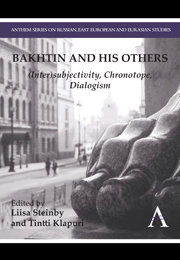Book contents
- Frontmatter
- Contents
- Acknowledgments
- Translation and Transliteration
- Introduction: The Acting Subject of Bakhtin
- Chapter 1 Bakhtin and Lukács: Subjectivity, Signifying Form and Temporality in the Novel
- Chapter 2 Bakhtin, Watt and the Early Eighteenth-Century Novel
- Chapter 3 Concepts of Novelistic Polyphony: Person-Related and Compositional-Thematic
- Chapter 4 Familiar Otherness: Peculiarities of Dialogue in Ezra Pound's Poetics of Inclusion
- Chapter 5 Author and Other in Dialogue: Bakhtinian Polyphony in the Poetry of Peter Reading
- Chapter 6 Tradition and Genre: Thomas Kyd's The Spanish Tragedy
- Chapter 7 Bakhtin's Concept of the Chronotope: The Viewpoint of an Acting Subject
- Chapter 8 The Provincial Chronotope and Modernity in Chekhov's Short Fiction
- List of Contributors
Chapter 4 - Familiar Otherness: Peculiarities of Dialogue in Ezra Pound's Poetics of Inclusion
Published online by Cambridge University Press: 05 May 2013
- Frontmatter
- Contents
- Acknowledgments
- Translation and Transliteration
- Introduction: The Acting Subject of Bakhtin
- Chapter 1 Bakhtin and Lukács: Subjectivity, Signifying Form and Temporality in the Novel
- Chapter 2 Bakhtin, Watt and the Early Eighteenth-Century Novel
- Chapter 3 Concepts of Novelistic Polyphony: Person-Related and Compositional-Thematic
- Chapter 4 Familiar Otherness: Peculiarities of Dialogue in Ezra Pound's Poetics of Inclusion
- Chapter 5 Author and Other in Dialogue: Bakhtinian Polyphony in the Poetry of Peter Reading
- Chapter 6 Tradition and Genre: Thomas Kyd's The Spanish Tragedy
- Chapter 7 Bakhtin's Concept of the Chronotope: The Viewpoint of an Acting Subject
- Chapter 8 The Provincial Chronotope and Modernity in Chekhov's Short Fiction
- List of Contributors
Summary
Ezra Pound's long poem The Cantos (1970) seems to readily lend itself to Bakhtinian analysis: it provides ample evidence of literary and extraliterary heteroglossia, dialogization, irony, indeterminacy, and semantic openendedness. The Cantos may be especially instrumental in illustrating Bakhtin's idea of the development of the epic genre: comparing it with classic epic poems, one cannot but notice the disappearance of the absolute epic distance, the permeation of modernity in the text of this modern ‘tale of the tribe’, as well as dramatic changes in the way the author positions himself in the text.
Pound scholarship has long distanced itself from charges of fascism; nor did the ideas of militant monologism associated with it prove particularly productive in comparison with the dialogic approach, as represented by Line Henriksen's (2006) analysis of The Cantos as a heteroglossic model of lyric. References to the polyphonic nature of The Cantos have indeed become commonplace. The divide between the classic epic and the modern one is so obvious that a ‘new’ genre type has recently been suggested (Murphy 1989) for American long poems, the ‘verse novel’, with reference to Bakhtin's theory of the ‘novelization’ of genres and V. V. Ivanov's concept of ‘prosaization’ of twentieth-century poetry.
- Type
- Chapter
- Information
- Bakhtin and his Others(Inter)subjectivity, Chronotope, Dialogism, pp. 55 - 72Publisher: Anthem PressPrint publication year: 2013



